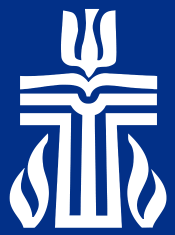 As Christians we share many of the beliefs of our brothers and sisters in other Christian denominations. There are some faith issues that we emphasize that may differ from some other denominations.
As Christians we share many of the beliefs of our brothers and sisters in other Christian denominations. There are some faith issues that we emphasize that may differ from some other denominations.
1. We believe the Scriptures to be authoritative for our faith and practice. It is through the revelation of the scriptures that we learn who God is–Father, Son and Holy Spirit, and who we are as God’s children.
2. We believe that baptism is the sign of our adoption into the family of faith. For us, baptism is offered not only to believers, but also to their children. At the same time, we honor and recognize baptism from other Christian churches and do not require rebaptism to become a part of our fellowship.
3. We believe that Holy Communion should be offered and open to all baptized believers whether they are a member of our particular church or not. We believe that children should be welcomed to the table after receiving instruction from the pastor as to the significance of the sacrament.
4. We believe in the priesthood of all believers and that God’s call to serve as an ordained leader in the church should be open to qualified persons, regardless of gender or marital status.
5. We believe in using a representative form of government to enable us to work together to carry out our ministry and mission.
We stand in line behind centuries of Christians who have lived and died for their faith. In our worship services each week we affirm our solidarity with those who have gone before us by reciting one of the creeds written by faithful Christians, many times written to refute specific heresies.
Most Sundays we recite one of the oldest creeds, The Apostle’s Creed. It was written in the 4th century.
It reads:
“I believe in God the Father Almighty, maker of heaven and earth, and in Jesus Christ, his only Son our Lord. Who was conceived by the Holy Ghost, born of the virgin Mary, crucified under Pontius Pilate, was crucified, dead and was buried. He descended into hell. On the third day he rose again from the dead, ascended into heaven and sitteth on the right hand of God the Father. From thence he shall come to judge the quick and the dead. I believe in the Holy Ghost, the holy catholic church, the communion of saints, the forgiveness of sins, the resurrection of the body, and the life everlasting. Amen.”
Admittedly, there are some phrases in this ancient creed that do not translate well into our 21st century vernacular. However, it was written by faithful Christians to address specific concerns in their time and as Presbyterians we do not feel it is our perogative to edit another century’s creed.
Allow us to explain some of the terms.
1. “Holy Ghost.” – Today most Christians prefer to use the term Holy Spirit.
2. “He descended into hell” – Certainly the pain and torture which Jesus endured on the cross was hellish, but the Christian church affirms that the days that Jesus was in the tomb his spirit went to hell, also called hades or the place of the dead, and preached to those who had lived before him and gave them the opportunity to hear about him and to respond.
3. “quick and the dead” – The word “quick” refers to those who are alive at Jesus return.
4. “the holy catholic church” – This phrase instigates the most frequently asked question we ever get. Again, this creed was written in the 4th Century, at a time when there was only one church around the world, the Orthodox church. Their descendents are still around. In your experience you may have encountered someone from the Greek Orthodox Church or the Russian Orthodox Church. At that time the word “catholic” meant universal.” So the phrase, “holy catholic church,” referred to the Christian church around the world no matter what country it was in. It wasn’t until the 11th century when the church in Italy, which had its headquarters in Rome split from the Orthodox church to form a separate church that came to be called the Roman Catholic Church. Rather than edit the copy of a previous century, we prefer to explain the difference in meaning of the words than change the wording.
 First Presbyterian Church Tomball
First Presbyterian Church Tomball